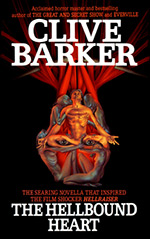
![]() jynnantonnyx
jynnantonnyx
1/2/2013
![]()
"The doorway was even now opening to pleasures no more than a handful of humans had ever known existed, much less tasted—pleasures which would redefine the parameters of sensation, which would release him from the dull round of desire, seduction and disappointment that had dogged him from late adolescence."
It's not often one picks up a modern splatterpunk book and finds within it a morality tale, especially a tale so opposed to the moral atmosphere of the day. At least, I assume this doesn't happen often, since The Hellbound Heart is the only splatterpunk story I can ever remember reading. The quote above is about the novella's antagonist Frank, a hedonist who has spent all of his adult life in search of the most extreme pleasures. One can only enjoy so many drugs and prostitutes before the pleasure becomes dull and repetitive, so Frank seeks out new avenues through the occult. He hears of the Lament Configuration, a puzzle box which, if opened, will open a door to the world of the Cenobites, a perverse religious order dedicated to unworldly pleasure. After performing numerous favors for unsavory individuals, he finally gains possession of the box, and brings it home to England to open it. Unfortunately for Frank, when the Cenobites finally appear, their mutilated bodies indicate that their "pleasure" is actually found in pain, that they are demonic sadomasochists who intend to subject Frank to an eternity of flesh-destroying fun. The rest of the story follows his brother's family and social circle as Frank attempts to return to Earth by corrupting those he left behind.
Anyone who has seen the film Hellraiser will be familiar with this story. Clive Barker reportedly wrote The Hellbound Heart as a covert film pitch, and he did finally manage to both write and direct the film adaptation in 1987. The iconic Pinhead does not appear in the novella, although a minor Cenobite with similar deformities appears briefly. I've not seen Hellraiser, but Rob Ager's analysis of the film's themes got me interested in the book. Barker's output numbers in the dozens of volumes, and includes the young adult series Abarat and his massive interweaving story collection Books of Blood.
The novella is short, giving credence to the suspicion that it's mostly a glorified film treatment. It even seems to have Hollywood style act breaks. This makes the story easy to read, and it is hard not to imagine it as a film while reading it. I'm sure that's even harder to avoid if you've seen the film. The blood, gore, and bodily mutilation is vivid enough that I had to put down the book a number of times. I don't think I'm particularly queasy when it comes to such things—the Inferno is one of my favorite stories of all time—but Barker almost makes you feel the pins digging into your skin.
Still, it's the moral themes of the story that are of the most interest to me. If I may be so bold as to provide an interpretation, Barker seems to be saying that hedonistic indulgence inevitably leads to pain and death. It's a very traditional moral theme, found in the ancient pagans and Christians alike, but largely discarded in our pleasure-seeking age. Frank is the man for whom no sexual pleasure was ever enough, and his desperate search for satiation ended very badly for him and for everyone around him. If the Horror genre really is an expression of our subconscious fears, perhaps this gross little novella expresses our fear of pleasure gone out of control, grown so desperate that it will consume everything in its path. It is the story of a heart bound for Hell.
http://blog.worldswithoutend.com/2012/10/the-hellbound-heart-by-clive-barker/